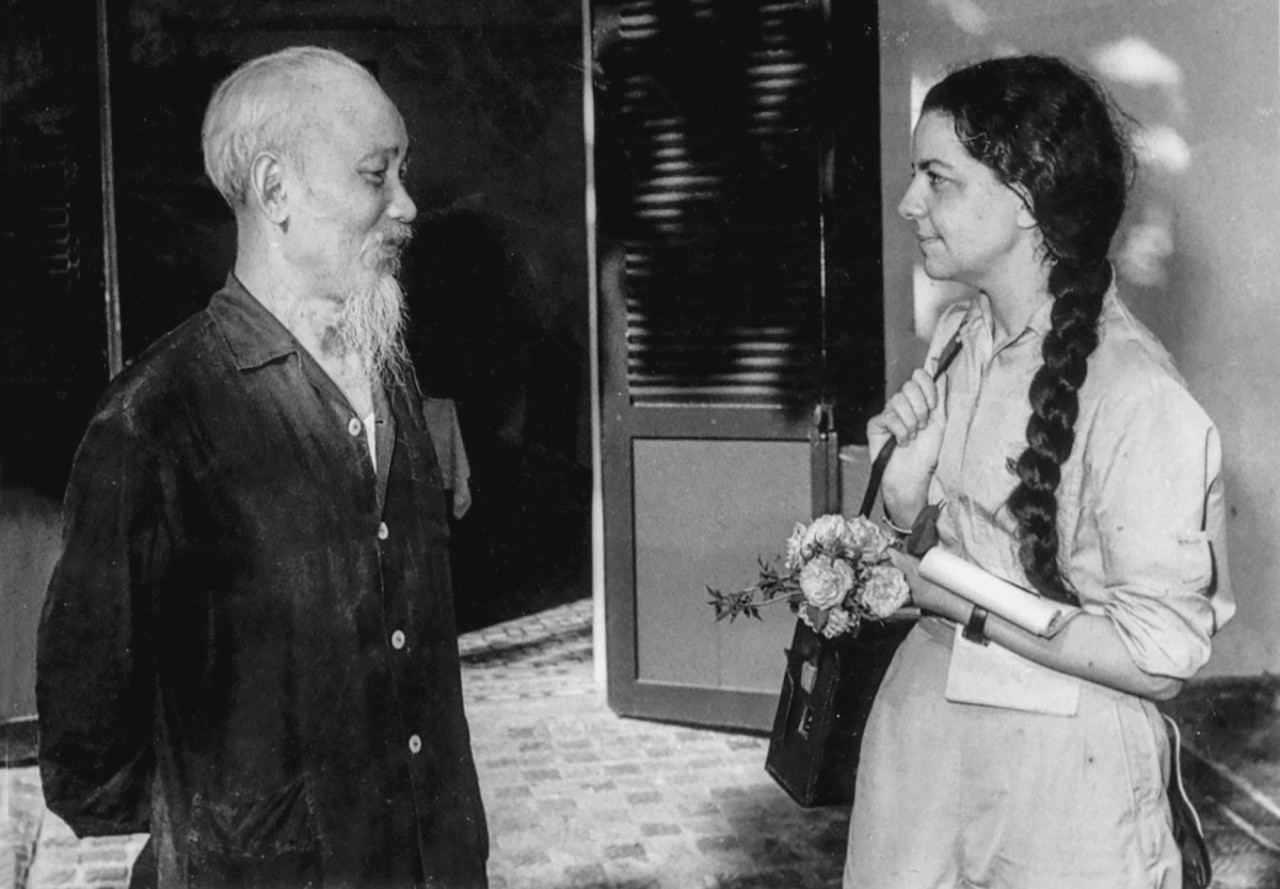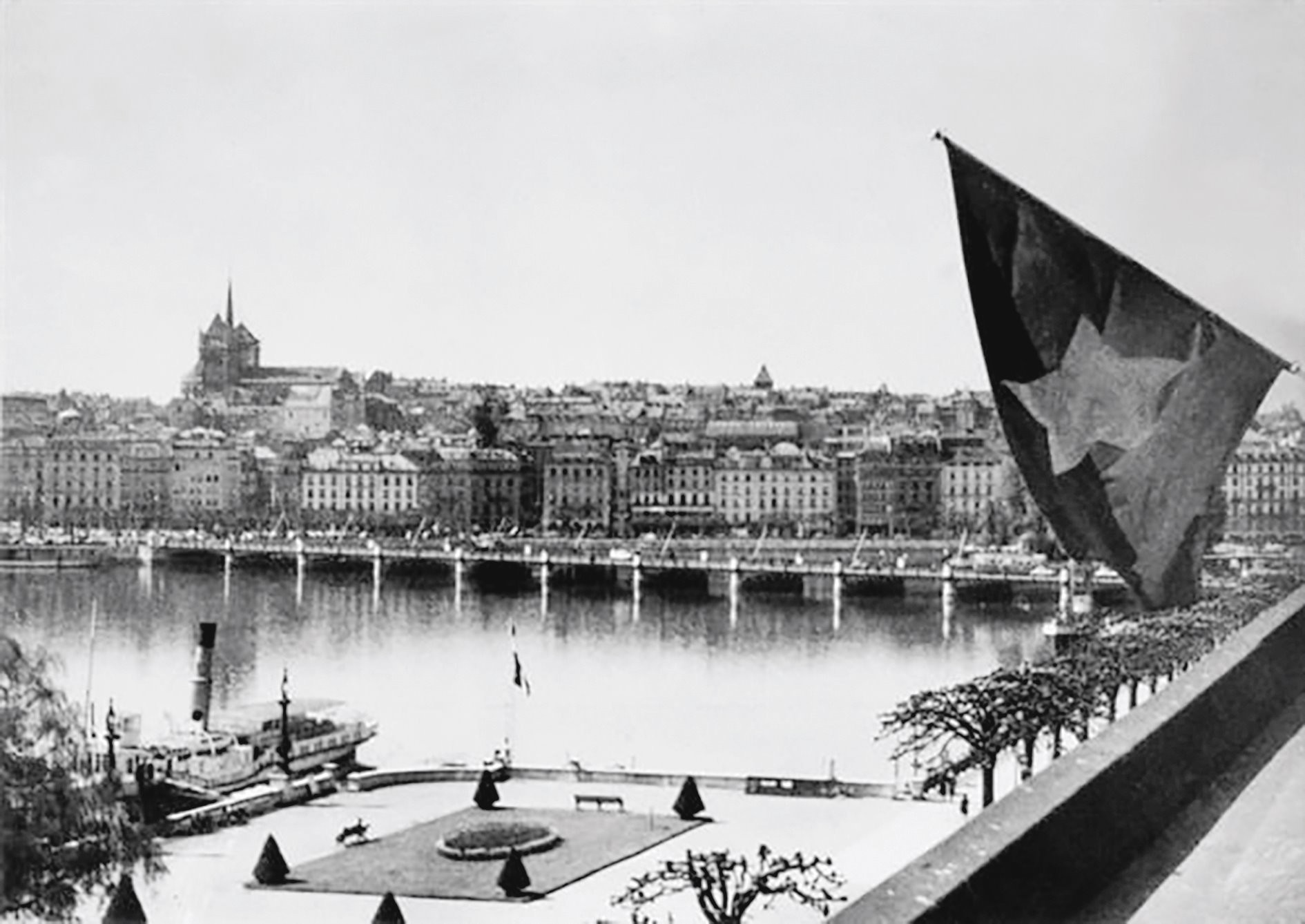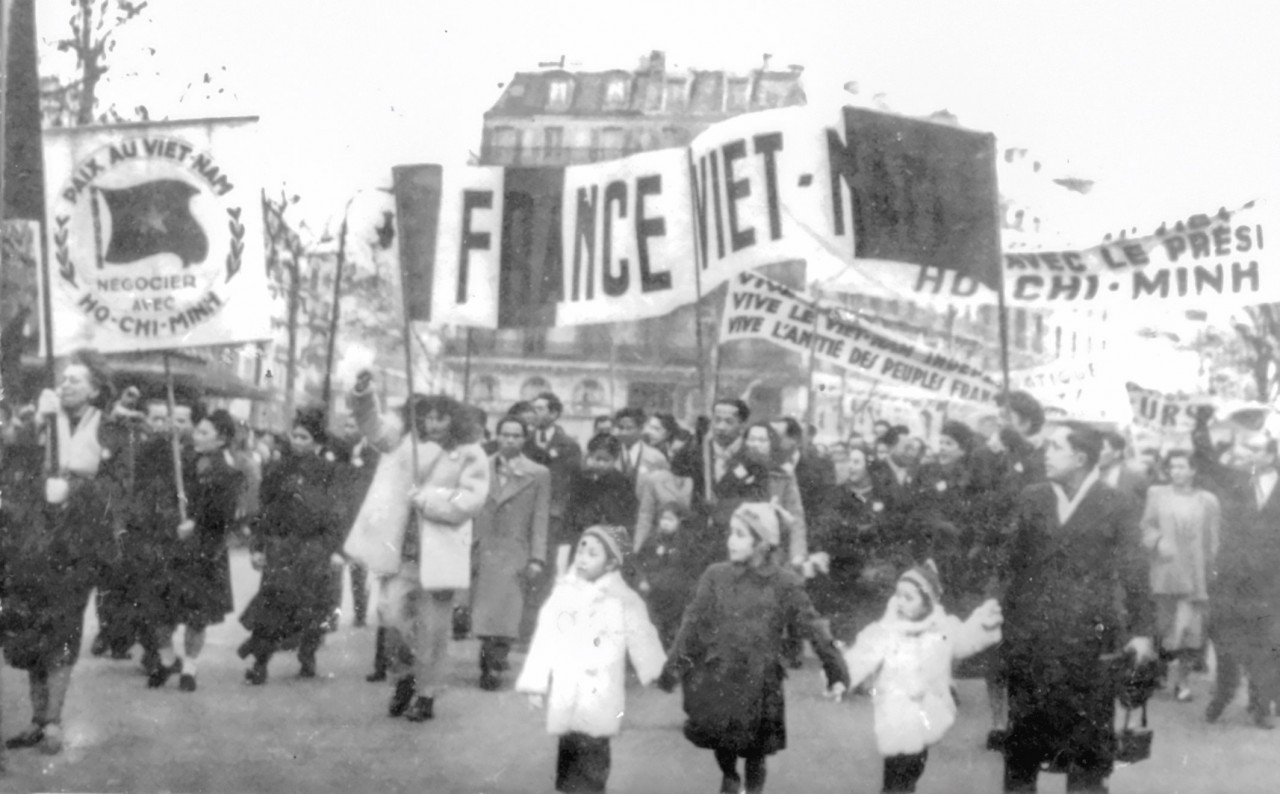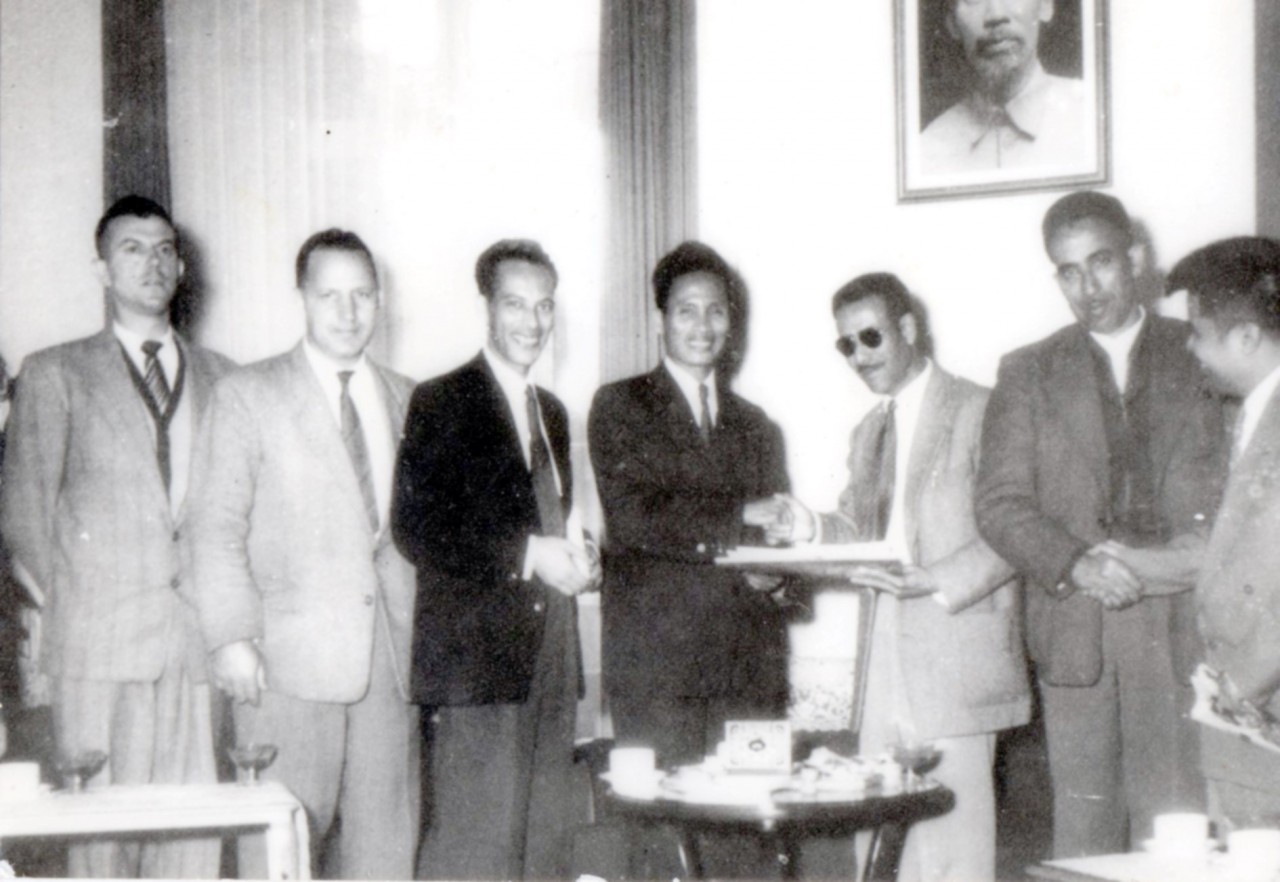
A French flag in the reception room of the Democratic Republic of Vietnam delegation in Geneva
Latest
 |
| President Ho Chi Minh received French journalist Madeleine Riffaud, who enthusiastically supported Vietnam and opposed the French war, in 1966. |
From Moscow to Geneva
Mr. Co and I landed in Geneva at noon on a military plane. Mr. Chanh (Leo), the delegation’s doctor, was waiting to greet us. During the resistance against the French, Mr. Chanh served as a physician and Head of the Central Committee on Healthcare. He was tasked with taking care of the health of Uncle Ho and high-ranking Party officials. We knew each other well. We embraced warmly. Mr. Chanh took us to Hotel d’Angleterre by Lake Geneva.
We were briefed on our mission by Mr. Nguyen Thanh Ha, the delegation’s secretary. Our task was a French interpreter, mostly translating documents from Vietnamese to French. On the night we arrived, Mr. Dong called us to a villa in Versoix. It was around 7:30 or 8 p.m Swiss time, Mr. Dong briefed us about the situation of the Conference and gave us our mission. Just a few meetings into the Conference so the positions of both sides were still far apart. The French delegation had only requested a ceasefire. However, they insisted on making their Vietnamese puppet government attend these meetings.
Our delegation is responsible not only for Vietnam but also for the revolutionary movements in Laos and Cambodia. While there were suggestions for both countries to send representatives to the conference, they declined. At this juncture, it’s crucial for the world and the French people to understand the struggles of the Laotian and Cambodian people, but international dissemination materials were too scarce. Both Co and I speak French, so we must urgently translate our documents, as well as those of Laos and Cambodia, into French. Mr. Dong also emphasized that all activities and security measures must strictly adhere to the regulations set by the delegation, set by Mr. Nguyen Thanh Ha.
The documents introduce a summary of the revolutionary process, the revolutionary forces, and the achievements of each country’s struggle. It is necessary to make readers aware that these are increasingly powerful movements, with established governments, armies (engaging in guerrilla warfare and advancing towards concentrated attacks), liberation zones, production movements, and literacy campaigns. They feature prominent figures and talents, fully supported by the people. In June and July, the Conference was temporarily suspended. During this time, delegations worked extensively outside of the Conference. At this point, the French people understood more about the situation in Indochina and Vietnam, especially as their failures at Dien Bien Phu became increasingly apparent.
 |
| Red flag with yellow star hanging at the Headquarters of the Delegation of the Democratic Republic of Vietnam in Geneva (Switzerland), 1954. |
They understood that the Indochina war could not lead to victory. Lives and resources were lost, not only of the people of Indochina but also of France. All strata of French society had children stationed in Indochina, from wealthy bourgeois families to working-class individuals dependent on wages that were losing value. The French people also wanted to participate in restoring peace in Indochina. Following the initiative of the French Communist Party, the French General Confederation of Labor, and many unions (including Catholic unions), as well as numerous youth and women’s organizations, various French people’s delegations went to Geneva to meet with all delegations and present their proposals for peace.
To the delegation’s reception room
According to Mr. Pham Van Dong’s opinion, the Vietnamese delegation put a strong emphasis on receiving guests. It was handled by Mr. Ha, then Mr. Tran Trong Quat and I also joined in later on. In estimation, each day we received about 20 to 25 groups.
Our delegation’s attitude towards visiting delegations from France was very clear. We considered them as allies, fighting together for the success of the Geneva Conference, to establish peace in Vietnam and Indochina, to recognize the independence and sovereignty of the Vietnamese people, and to open a new chapter in Franco-Vietnamese relations based on mutual respect and mutual benefit. Representatives of the French Communist Party have greatly assisted us in publicizing Vietnam’s stance.
A French person once said: “To understand Vietnam’s position and thoughts, one only needs to read the Humanité newspaper. Mostly thanks to Humanité, our delegation had a public press agency to convey to the French people what we wanted to say and how we wanted them to help specifically. Among them, the writer and journalist Madeleine Riffaud directly “advises” and supports me in receiving guests.”
 |
| The French people protest, demanding an end to the war in Vietnam. |
The groups visiting our delegations came in all shapes and sizes. The largest and most diverse group was the peace delegation led by a dignitary, usually organized by the Communist Party or the General Confederation of Labor. There were also groups of workers (railway workers, steelworkers...), as well as from Youth Union, the Communist Youth, and the Women’s Union. There were groups of wives and children of French officers taken prisoner at Dien Bien Phu or families of French soldiers and African-American soldiers. There were also groups of prisoners and inmates from French colonies. There were also groups with just one intellectual, such as Professor Blondel (my teacher at the University of Medicine and Pharmacy in Hanoi before 1945).
An elderly gentleman with silvered hair came with a peace delegation to meet us. He told us that, his son, who, due to poverty, had joined the military and was in Indochina. He expressed his concern about his son’s whereabouts, wondering if he had been captured in Dien Bien Phu. Of course, we didn’t have that information. Nonetheless, we recorded his son’s name and his troop number.
We also asked Vietnamese authorities to send a list of prisoners at Dien Bien Phu so that we could give him some pieces of information. Another woman, the wife of a military officer from Lyon, knew that her husband had been captured in Dien Bien Phu. She brought along her young son, barely six years old, seeking information. We noted her request and informed her about the humane treatment in Vietnam in case her husband was indeed captured in Dien Bien Phu.
The decoration in the reception rooms was simple yet dignified. Hung side by side were portraits of President Ho Chi Minh, the Vietnamese flag, and the French flag. Many French delegations paid close attention to the presence of the French flag alongside the Vietnamese flag. Some asked, “You fight against us, so why display our flag?” In response, we explained that we were not fighting against the French people or France itself; we were only repelling aggressive invaders. We expressed sincere gratitude to the French people for their moral support, which we highly valued.
 |
| The Algerian delegation congratulated the Vietnamese delegation of the Democratic Republic of Vietnam in Geneva. |
Our heartfelt and truthful response moved many, especially French mothers and fathers with sons serving in Indochina. I continued, “We earnestly desire peace and independence. The war has dragged on, claiming lives or causing injuries to many French and Vietnamese sons and daughters. We greatly admire the sacrifices made by the French people in the struggle against fascism. We hope for the success of this conference in achieving justice and equality, restoring friendships, and fostering economic cooperation with France’’.
A French business once asked, after the war, if we Vietnamese were genuinely interested in doing business with France or if we would align ourselves with Communist China and Soviet instead. In response, we emphasized that Vietnam and France have had economic relations for nearly a century. Our people are accustomed to using French goods, including well-known brands like Peugeot bicycles and all kinds of medicine. Similarly, the French are aware of some products imported from Vietnam, such as coal, fertilizer, rice, rubber, etc. Economic relations are beneficial for both sides. The war has hindered these relations, but we hope that peace will help us re-establish them.
I have been learning French since I was six years old. I still want to learn more French to understand French culture and literature better. I was studying in Moscow, and since coming to Geneva, I have had the opportunity to practice speaking French with very kind and precious French people.
July 1994
* Excerpt from the memoir of Mr. Nguyen Sy Quoc, Major General, Professor, Doctor, former Vice Chairman of the General Department of Logistics, and former Director of the Department of Health, Ministry of National Defense. He and Dr. Nguyen Trinh Co were sent to Geneva to protect the health of diplomatic personnel and provide Russian translation for the Head of the Delegation, Pham Van Dong. They assisted the Vietnamese delegation in engaging with Russian diplomatic personnel and participated in the reception team during the Geneva Conference.
[1] 1. Vice President Nguyen Luong Bang (1904-1979) was the first Ambassador of Vietnam to the Soviet Union from 1952 to 1956.













